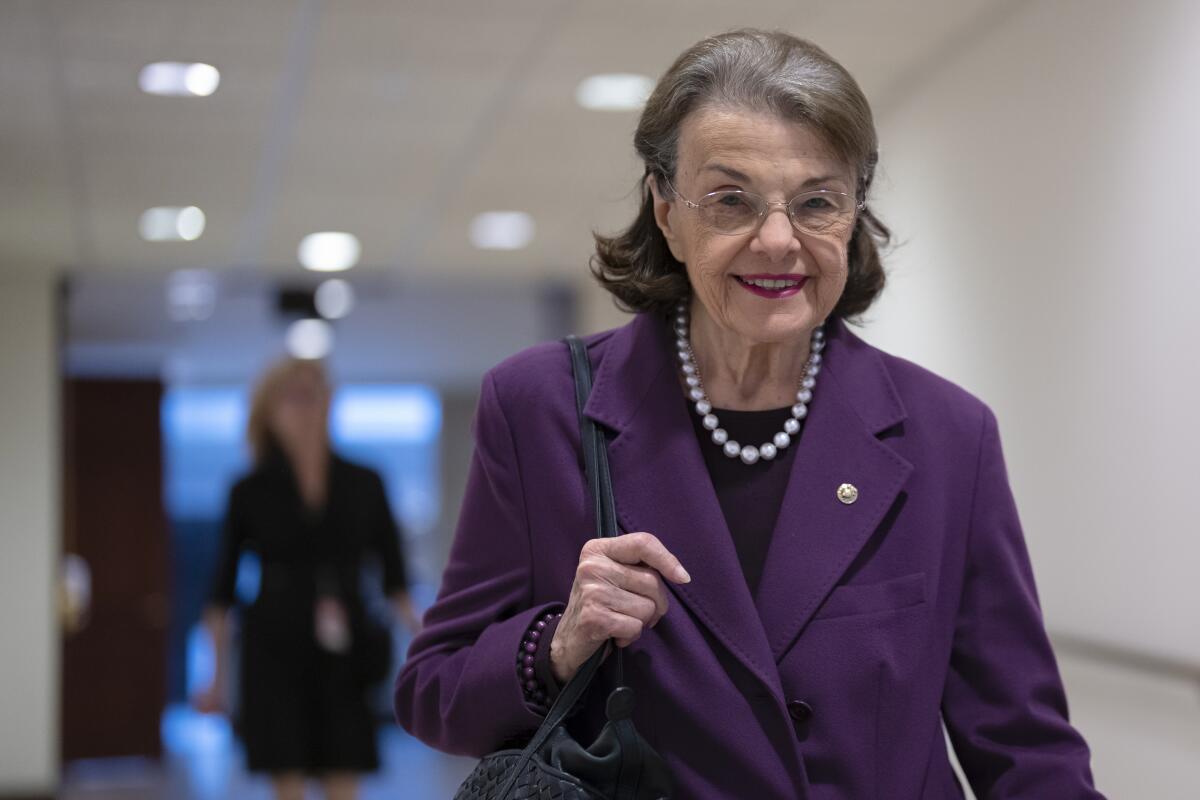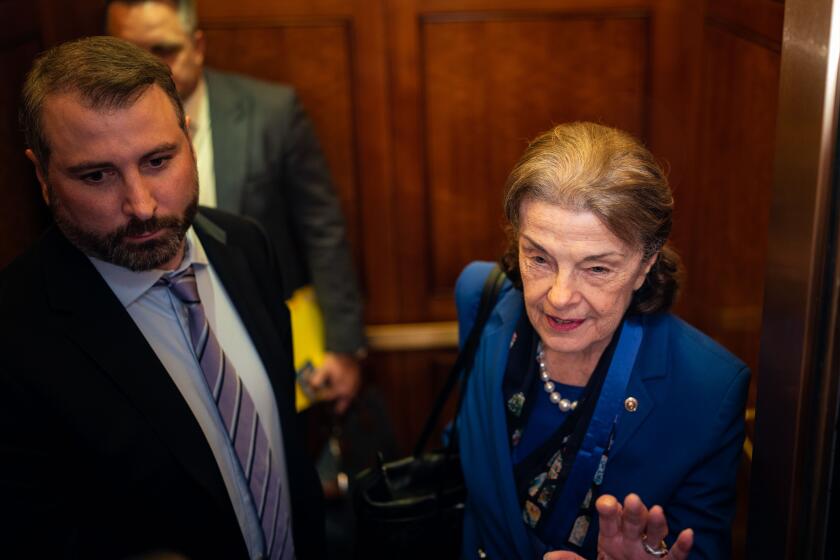Editorial: Feinstein’s continued absence from the Senate jeopardizes progress on her life’s work

We do not envy Sen. Dianne Feinstein.
California’s longest serving senator and the most senior member of the U.S. Senate planned to finish her term and retire after the 2024 election. But a bad case of shingles has left her sidelined at home in San Francisco since early March, unable to travel to Washington and with no clear indication of when she might improve enough to go back to work.
Her absence wouldn’t be a big deal except that in the closely divided Senate, Feinstein is a crucial Democrat vote, particularly on President Biden’s judicial appointments. A dozen nominees had been awaiting a vote in the Judiciary Committee; seven were approved by the committee on Thursday.
With Feinstein present, Democrats have 11 members to Republicans’ 10. With her absent, the panel is evenly split and Biden’s picks cannot move forward without GOP support — which is no certainty these days given the partisan and ideological battle for influence in the courts. While judicial appointments may be the foremost concern, Democrats’ slim majority in the Senate also means Feinstein’s continued absence will make raising the debt ceiling or approving Biden’s nominee for labor secretary difficult, if not impossible.
Here’s one reason Sen. Feinstein’s absence is drawing unusual attention: She is missed, badly. Democrats hold just a 51-49 Senate majority, so every vote is crucial.
Last week, acknowledging that her recovery has been slower than hoped, Feinstein asked Senate Majority Leader Charles E. Schumer (D-N.Y.) to appoint a temporary replacement for her on the Judiciary Committee. Schumer was willing but Republicans rejected the idea — loath to allow Biden’s judicial picks to move forward.
That puts the pressure back on Feinstein. The senator is in the extraordinarily difficult position of having to reckon with how her health might affect her ability to return to Washington. The decision is hers to make, in consultation with her doctors, family and close associates.
Feinstein has been a steadfast public servant for decades. Surely, she knows her role in the Senate is so important that a long leave will have serious consequences for her constituents, her party and the nation. Her continued absence could stymie progress on issues that she’s dedicated her career to advancing including women’s rights, LGBTQ protections and gun control.
The time may soon come for Feinstein to resign. Gov. Gavin Newsom should resist efforts to hijack her Senate seat and instead appoint a caretaker, letting voters choose among would-be successors.
The Judiciary Committee confirms federal judicial nominees who wield incalculable power over Americans’ lives. Biden has been racing to fill federal court vacancies over the last two years, adding more women, people of color and those with diverse professional backgrounds to the bench. Biden’s nominees offer an important counterbalance to the huge number of federal judges and conservative Supreme Court justices that then-Senate Majority Leader Mitch McConnell (R-Ky.) was able to push through during President Trump’s term.
The shift in the courts has already had demonstrable effects. The conservative majority on the Supreme Court overturned Roe vs. Wade last year, and the Texas judge who invalidated the Food and Drug Administration’s approval of the abortion drug mifepristone earlier this month on specious grounds was a Trump appointee.
Feinstein also has to consider her admirable legacy on controlling the indiscriminate use of semiautomatic weapons and other rational gun controls — and then to look at how judges appointed by opponents of those controls are undermining all that she worked for. Her continued absence blocks the confirmation of judges who likely are less aligned with extremist pro-gun views as the many judges appointed and confirmed during the Trump era.
Federal judges have lifetime appointments, so Democrats have little recourse except to fill vacancies with appointees who will not roll back decades of bodily autonomy and gun control or support intolerance and discrimination — when they have the power to do so. As long as Feinstein is unable to work, they don’t have that power, and that’s a situation that cannot continue.
This is probably not how Feinstein envisioned her final years in office. Ideally she would have the time and space to recover in peace and return to her life’s work, but these are not ideal times. With the balance of power so tenuous in Washington and the stakes so high at every election, there’s no leeway to keep missing critical votes. We wish Feinstein well in the coming days as she considers perhaps the most difficult decision of her long, storied career.
More to Read
Updates
10:11 a.m. April 20, 2023: The editorial has been updated to reflect the Senate Judiciary Committee vote on Thursday.
A cure for the common opinion
Get thought-provoking perspectives with our weekly newsletter.
You may occasionally receive promotional content from the Los Angeles Times.












